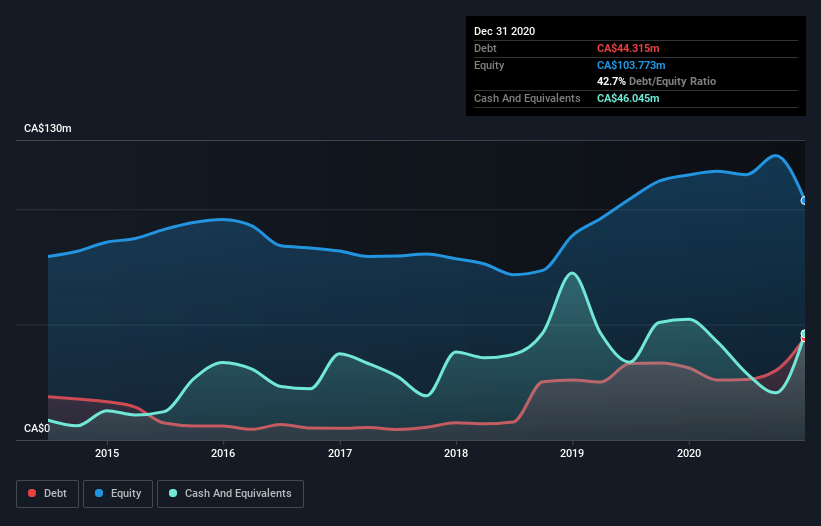David Iben put it well when he said, 'Volatility is not a risk we care about. What we care about is avoiding the permanent loss of capital.' When we think about how risky a company is, we always like to look at its use of debt, since debt overload can lead to ruin. We can see that Macro Enterprises Inc. (CVE:MCR) does use debt in its business. But should shareholders be worried about its use of debt?
Why Does Debt Bring Risk?
Debt and other liabilities become risky for a business when it cannot easily fulfill those obligations, either with free cash flow or by raising capital at an attractive price. Ultimately, if the company can't fulfill its legal obligations to repay debt, shareholders could walk away with nothing. While that is not too common, we often do see indebted companies permanently diluting shareholders because lenders force them to raise capital at a distressed price. Of course, plenty of companies use debt to fund growth, without any negative consequences. When we examine debt levels, we first consider both cash and debt levels, together.
Check out our latest analysis for Macro Enterprises
What Is Macro Enterprises's Debt?
The image below, which you can click on for greater detail, shows that at December 2020 Macro Enterprises had debt of CA$44.3m, up from CA$31.3m in one year. But it also has CA$46.0m in cash to offset that, meaning it has CA$1.73m net cash.

A Look At Macro Enterprises' Liabilities
We can see from the most recent balance sheet that Macro Enterprises had liabilities of CA$53.0m falling due within a year, and liabilities of CA$26.4m due beyond that. Offsetting this, it had CA$46.0m in cash and CA$46.0m in receivables that were due within 12 months. So it can boast CA$12.6m more liquid assets than total liabilities.
This excess liquidity suggests that Macro Enterprises is taking a careful approach to debt. Due to its strong net asset position, it is not likely to face issues with its lenders. Simply put, the fact that Macro Enterprises has more cash than debt is arguably a good indication that it can manage its debt safely.
Importantly, Macro Enterprises's EBIT fell a jaw-dropping 74% in the last twelve months. If that earnings trend continues then paying off its debt will be about as easy as herding cats on to a roller coaster. The balance sheet is clearly the area to focus on when you are analysing debt. But it is future earnings, more than anything, that will determine Macro Enterprises's ability to maintain a healthy balance sheet going forward. So if you're focused on the future you can check out this free report showing analyst profit forecasts.
But our final consideration is also important, because a company cannot pay debt with paper profits; it needs cold hard cash. While Macro Enterprises has net cash on its balance sheet, it's still worth taking a look at its ability to convert earnings before interest and tax (EBIT) to free cash flow, to help us understand how quickly it is building (or eroding) that cash balance. Over the last three years, Macro Enterprises saw substantial negative free cash flow, in total. While investors are no doubt expecting a reversal of that situation in due course, it clearly does mean its use of debt is more risky.
Summing up
While we empathize with investors who find debt concerning, you should keep in mind that Macro Enterprises has net cash of CA$1.73m, as well as more liquid assets than liabilities. So although we see some areas for improvement, we're not too worried about Macro Enterprises's balance sheet. When analysing debt levels, the balance sheet is the obvious place to start. However, not all investment risk resides within the balance sheet - far from it. We've identified 3 warning signs with Macro Enterprises (at least 1 which is a bit unpleasant) , and understanding them should be part of your investment process.
If you're interested in investing in businesses that can grow profits without the burden of debt, then check out this free list of growing businesses that have net cash on the balance sheet.
If you're looking for stocks to buy, use the lowest-cost* platform that is rated #1 Overall by Barron’s, Interactive Brokers. Trade stocks, options, futures, forex, bonds and funds on 135 markets, all from a single integrated account. Promoted
New: Manage All Your Stock Portfolios in One Place
We've created the ultimate portfolio companion for stock investors, and it's free.
• Connect an unlimited number of Portfolios and see your total in one currency
• Be alerted to new Warning Signs or Risks via email or mobile
• Track the Fair Value of your stocks
This article by Simply Wall St is general in nature. It does not constitute a recommendation to buy or sell any stock, and does not take account of your objectives, or your financial situation. We aim to bring you long-term focused analysis driven by fundamental data. Note that our analysis may not factor in the latest price-sensitive company announcements or qualitative material. Simply Wall St has no position in any stocks mentioned.
*Interactive Brokers Rated Lowest Cost Broker by StockBrokers.com Annual Online Review 2020
Have feedback on this article? Concerned about the content? Get in touch with us directly. Alternatively, email editorial-team (at) simplywallst.com.
About TSXV:MCR
Macro Enterprises
Macro Enterprises Inc. provides pipeline and facilities construction and maintenance services to the oil and gas industry in western Canada.
Excellent balance sheet and good value.
Market Insights
Community Narratives



